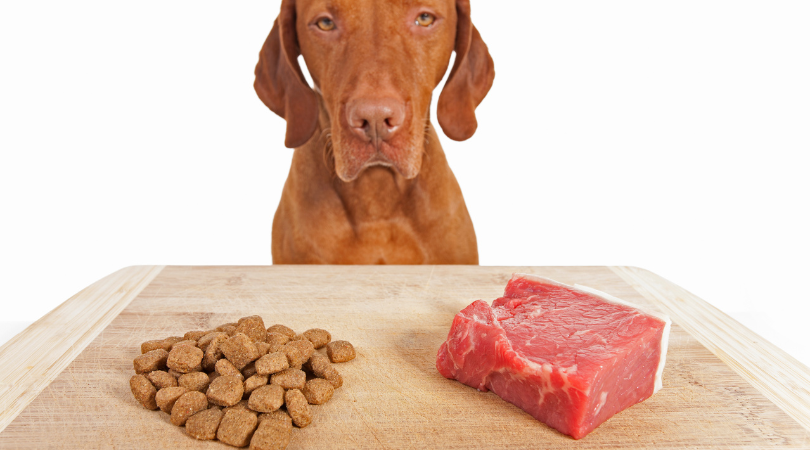The Issues of Starch in Pet Foods
Posted by Jewel on Feb 19, 2025
As pet owners, we often trust that commercial pet foods, kibble as well as all the premade raw foods are formulated to meet the nutritional needs of our beloved companions. However, a closer look reveals a concerning truth: many of these foods contain high levels of starch, a nutrient that is not only unnecessary for carnivores like dogs and cats but also potentially harmful to their health. Understanding the concerns of feeding too much starch, even in many of the premade raw diets there are many vegetables like pumpkin, squash, carrots, broccoli, potatoes, pets etc.
Feeding a species appropriate raw diet is crucial for ensuring that our pets live long, healthy lives.
Understanding the Natural Diet of Carnivores
Dogs and cats are obligate carnivores, meaning their bodies are designed to thrive on a diet primarily composed of raw meat, organs, bones and fat. Throughout their evolution, these animals have developed specific physiological traits that reflect their carnivorous diets. Their sharp, pointed teeth are perfect for tearing meat, not grinding grains or other plant materials. Additionally, their short digestive tracts are optimized for rapidly processing meat, with little to no capacity for breaking down complex carbohydrates like starches.
Unlike omnivores, carnivores lack significant amounts of salivary amylase, an enzyme necessary for the digestion of starches. This means that when dogs and cats consume starchy foods, these substances pass through their digestive systems relatively undigested, potentially leading to a host of gastrointestinal issues.
The Prevalence of Starch in Commercial Pet Foods 
Despite their carnivorous nature, many commercial pet foods are laden with starches. The reason is simple: starch is a cheap and versatile ingredient. It acts as a binder, helping to hold kibble together, and it adds bulk to the food, making it more cost-effective to produce. Common sources of starch in pet foods include corn, wheat, rice, and potatoes—all of which are far removed from the natural diet of carnivores.
The use of starches in pet food is not just a cost-saving measure; it’s also a byproduct of the industry's shift toward mass production and convenience. However, the convenience of feeding our pets a diet high in starches comes at a significant cost to their health.
The Impact of Starch on Pet Health
Starch in pet food is a major concern, especially for carnivorous animals like dogs and cats, who have no biological need for it. Here’s why:
Carnivores Are Not Built to Digest Starch
Dogs and cats are obligate carnivores (cats) and facultative carnivores (dogs), meaning their digestive systems are designed for meat-based diets, not carbohydrates. Their bodies lack the enzymes (like amylase in saliva) needed to properly break down starch before it enters the stomach.
- Cats: Have almost zero ability to process carbohydrates efficiently.
- Dogs: Can tolerate small amounts, but excess starch leads to digestive stress and long-term health issues.
Starch is a Cheap Filler in Pet Food
Most commercial pet foods use starch from grains, legumes, potatoes, or peas as a binding agent to form kibble. However, these starchy fillers offer no nutritional benefit to carnivores and can contribute to obesity, diabetes, and inflammation.
- Excess starch converts to sugar → leading to weight gain & metabolic disease.
- Starch spikes blood sugar levels → increasing risk of diabetes.
- Gut imbalance & inflammation → weakening immune function & digestion.
Starch Feeds Harmful Bacteria & Yeast
Excess carbohydrates ferment in the gut, feeding bad bacteria and yeast like Candida. This often leads to:
Chronic ear infections
Skin issues & itching
Digestive upset & bloating
Long-Term Health Consequences:
A diet high in starch can lead to a cascade of chronic health issues, including metabolic syndrome, fatty liver disease, inflammatory bowel conditions, and even certain types of cancer. These conditions are exacerbated by the inflammation that results from poor dietary choices.
Alternatives to Starch-Rich Pet Foods
The good news is that there are plenty of alternatives to starch-laden commercial pet foods:
Raw and Prey Model Diets: We highly recommend this option - we are prey model feeders and promote this method of feeding carnivore pets. These diets mimic the natural feeding habits of carnivores in the wild, focusing on raw meat, bones, and organs. This approach provides the nutrients pets need without the unnecessary fillers and carbohydrates found in most commercial foods. We have many posts on this website about Prey model feeding and there is tons of info on the web about how to get started on it.
Grain-Free and Low-Carb premade Options: For those who prefer commercial diets, there are premade raw diets pet food options available. However, it’s essential to read labels carefully, as some grain-free foods still contain high levels of other starchy vegetables like sweet potatoes or peas.
Homemade Diets: I do notice that many pet parents are still wanting to cook their pets food. Although we don't recommend cooking as heat kills the enzymes it is still a far cry better then a kibble diet for sure. Preparing homemade meals for your pets allows you complete control over the ingredients. With guidance from a holistic veterinarian or pet nutritionist, you can create balanced, species-appropriate meals that align with your pet’s natural dietary needs.
The dangers of feeding starch-rich diets to our carnivorous pets cannot be overstated. While these foods may be convenient and cost-effective, they are far from what nature intended for our dogs and cats. By understanding the impact of starch on pet health and exploring alternative feeding options, we can take a significant step towards ensuring our pets live long, healthy, and happy lives. As responsible pet owners, it’s up to us to make informed choices about what we feed our furry companions—choices that prioritize their well-being over convenience.

